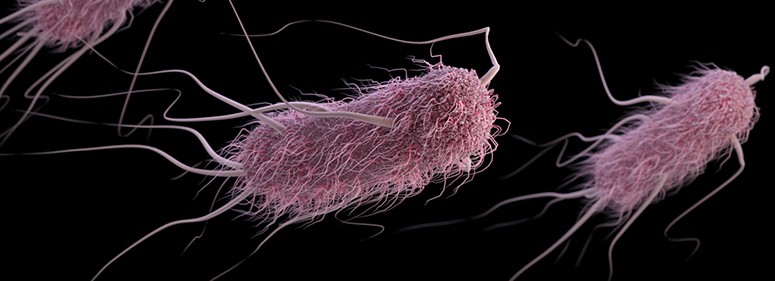Credit: CDC
Sometimes, breaking free of orthodoxy is necessary to gain new perspectives. Now in biology, this has been historically frowned upon, but in many ways, this type of ideological break is exactly what the field of synthetic biology has been built upon. Now, investigators at the University of Delaware are expanding upon this paradigm as they have engineered a common lab bacteria to produce a non-standard, synthetic amino acid—providing a foundation for developing unique vaccines and immunotherapies in the future.
In the recent study, which was published in Nature Chemical Biology, the researchers engineered E. coli to create para-nitro-L-phenylalanine (pN-Phe), an unorthodox amino acid that falls outside the twenty recognized standard amino acids and has yet to be found in natural settings. In previous investigations, pN-Phe has been utilized to stimulate the immune system's response toward proteins, which is typically indifferent.
“The nitro chemical functional group has valuable properties and has been underexplored by folks who are trying to rewire metabolism,” explained senior study author Aditya M Kunjapur, PhD, assistant professor of chemical and biomolecular engineering at the University of Delaware. “pN-Phone also has a nice history in the literature—it can be added onto a protein from a mouse, delivered back to mice, and the immune system will no longer tolerate the original version of that protein. That ability has promise for treating or preventing diseases caused by rogue proteins that the immune system struggles to lock onto.”
In order to amplify the pool of DNA-encoded amino acids or the 'alphabet,' the team implemented genetic code expansion techniques. Pairing these techniques with metabolic engineering, they engineered a system capable of autonomously producing nitrated proteins.
“Our study shows the construction of a live bacterial producer of synthetic nitrated proteins by coupling metabolic engineering and genetic code expansion, the authors wrote. “We achieved the biosynthesis of pN-Phe in Escherichia coli by creating a pathway that features a previously uncharacterized nonheme diiron N-monooxygenase, which resulted in pN-Phe titers of 820 ± 130 µM after optimization. After we identified an orthogonal translation system that exhibited selectivity toward pN-Phe rather than a precursor metabolite, we constructed a single strain that incorporated biosynthesized pN-Phe within a specific site of a reporter protein.”
“Because of the nitro functional group chemistry, the amino acid that we picked as our target for this project was unconventional, and many scientists within our field may not have expected that it could be made using biosynthesis,” Kunjapur clarified.
The upcoming phases of this research will involve optimizing synthesis techniques to yield larger quantities of nitrated proteins, along with extending this approach to other microorganisms. The grand scheme for the project is to fine-tune this platform for vaccine or immunotherapy applications, an endeavor bolstered by Kunjapur’s 2021 AIChE Langer Prize and the 2022 National Institutes of Health Director’s New Innovator Award. With this ambitious goal in mind, Kunjapur and doctoral candidate and co-author of this study, Neil Butler, have co-founded Nitro Biosciences.
Butler noted, “I think the implications are interesting, in that you can take a bacterium’s central metabolism, its ability to produce different compounds, and with a few modifications, you are able to expand its chemical repertoire. The nitro functionality is rare in biology and absent from the standard 20 amino acids, but we showed bacterial metabolism is malleable enough that it can be rewired to create and integrate this functionality.”
Kunjapur added, “Bacteria are potentially useful drug delivery vehicles. We think we have created a tool that could leverage the ability of bacteria to produce target antigens within the body and exploit the ability of nitration to shine a light on those antigens at the same time.”

















